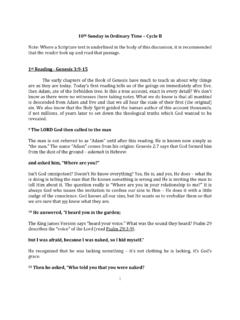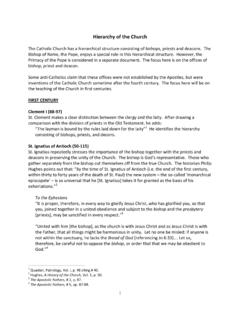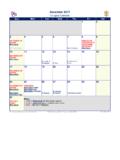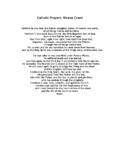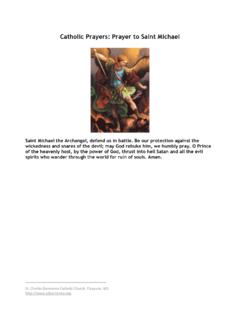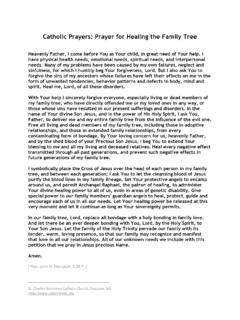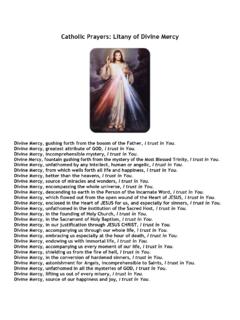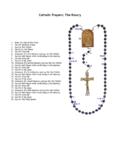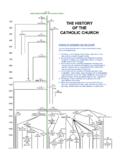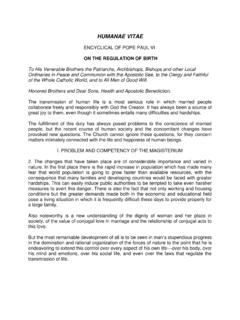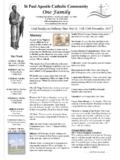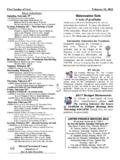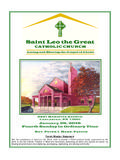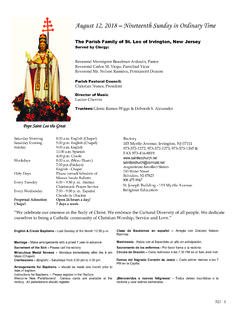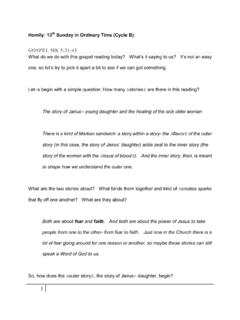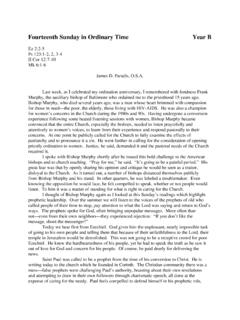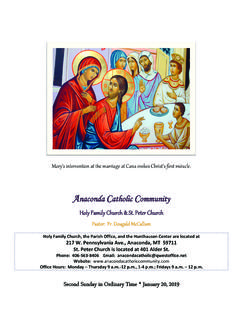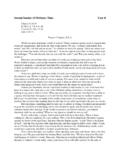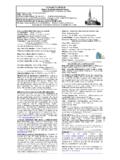Transcription of 13th Sunday in Ordinary Time - Cycle B - Charles …
1 1 13th Sunday in Ordinary time Cycle B Note: Where a Scripture text is underlined in the body of this discussion, it is recommended that the reader look up and read that passage. 1st Reading - Wisdom 1:13-15; 2:23-24 The Book of Wisdom was written in the late second or early 1st century in Greek. Until the discovery of the Dead Sea scrolls it was not known to have existed in Hebrew, but its discovery there shows that it was accepted and used by the Jews of Jesus time in the area of Palestine. It is believed to have been composed in Alexandria in Egypt. The Book of Wisdom is divided into three parts. The first part [the Book of Eschatology (1:1 through 6:21)] deals with the problem of retribution for good and evil and with the immortality that wisdom offers, concluding with an appeal to the reader to seek wisdom. The second part (6:22 through 11:1) describes wisdom and her operations in the world and explains how she is to be found.
2 The remainder of the book (11:2 through 19:22) is a historical illustration of the principles of the first two parts. We hear today from the beginning of the first part. 1:13 Because God did not make death, Not only physical death, but spiritual death eternal separation from God (the second death of Revelation 2:11 and 21:8). Life after death was not a universally held belief. The Pharisees held it, but the Sadducees did not (which is why they were sad, you see). The traditionally held belief was that the lot of all beyond the grave was the same; a weak and pale existence in sheol, separated from God. Reward and reparation were given in this world; long life, large family, riches, etc. The Book of Wisdom states the reward of life with God with assurance, although there is no mention of the resurrection of the body. nor does he rejoice in the destruction of the living.
3 14 For he fashioned all things that they might have being; and the creatures of the world are wholesome, And there is not a destructive drug among them The physical world does not have the capacity to cause spiritual death. nor any domain of the nether world on earth, The abode of the dead (sheol/hades/purgatory) 15 For justice is undying. It leads to immortality. 2 2:23 For God formed man to be imperishable; the image of his own nature he made him. Genesis 1:26 says that we are made in God s image we are spiritual beings with the immortality to which human beings are destined, but which can be lost through sin. The Book of Wisdom never says that we are by nature immortal, but rather that we receive immortality as a divine gift (3:4; 4:1; 8:13; 15:3). 24 But by the envy of the devil, death entered the world, and they who are in his possession experience it.
4 Again, spiritual death rather than physical death (Genesis 3:3-4). Eating the forbidden fruit (probably a fig medieval art shows an apple a play on the Latin molum which means either apple or evil thing. ) didn t just result in physical death but, more importantly, in separation from God s goodness spiritual death. This is the first biblical text to equate the serpent of Genesis 3 with the devil and one of a very few that refer to the fall (another being Sirach 25:23). The word translated as serpent in Genesis can also refer to a dragon (Revelation 12). Satan was a fallen angel, probably a seraph (the plural is seraphim, a name which means the burning ones the ones closest to God s fiery love). Seraphim are depicted in scripture as winged serpents (Isaiah 6:2) dragons. 2nd Reading - 2 Corinthians 8:7, 9, 13-15 Saint Paul is taking up a collection for the church in Jerusalem and he is now appealing to the generosity of the Corinthian people.
5 He uses this approach: You are already noted for your charisms of faith, writing and knowledge; now how about charity? 7 Now as you excel in every respect, in faith, discourse, knowledge, all earnestness, Saint Paul is pointing out the spiritual gifts which they have received. and in the love we have for you, Some translations (and some early manuscripts) render this your love for us, which seems to make more sense, at least to me, since he is pointing out spiritual gifts which they have received. Saint Paul is not trying to bully them, but wants them to share what they have, even their love; through the support of the Jerusalem church. may you excel in this gracious act also. 9 For you know the gracious act of our Lord Jesus Christ, that for your sake he became poor although he was rich, so that by his 3 poverty you might become rich. Jesus is the example of detachment and generosity.
6 Because He is God, He needed nothing but He voluntarily became man and the eternal sacrifice by which all mankind renews our covenant with God. He came, not as an earthly king, but as a common man, living in poverty from the time of His birth until His death on the altar of the cross. Sometimes He didn t even have the bare necessities of life, yet He gave everything. 13 [N]ot that others should have relief while you are burdened, but that as a matter of equality 14 your abundance at the present time should supply their needs, so that their abundance may also supply your needs, that there may be equality. The Corinthians are not expected to bankrupt themselves, but to share their surplus wealth, no matter how little it may be. In return, the spiritual abundance of Jerusalem can relieve the spiritual indigence of the new Christians at Corinth. 15 As it is written: Whoever had much did not have more, and whoever had little did not have less.
7 He quotes Exodus 16:18 which refers to the manna by which God nourished the Israelites in the desert. Everyone received an omer [about four liters (one gallon)] a day. Saint Paul is saying something similar: every Christian should have what he needs, and should help and/or be helped as necessary by his brother in faith. Gospel - Mark 5:21-43 The gospel reading of the 12th Sunday in Ordinary time is the first of a group of three miraculous actions, the stilling of the storm. This week we hear the third of this group, the healing of the sick. The miracle which is skipped over between Sunday readings is the exorcizing of a demon (Mark 5:1-20). These miracles occur early in Jesus public ministry. What we hear today is really two healing stories the healing of Jairus daughter (5:21-24, 35-43) and the healing of the woman with the flow of blood (5:25-34).
8 Another sandwich like the first reading of the 11th Sunday in Ordinary time , although this one is not an allegorical sandwich. The literary device of a sandwich was used by Saint Mark on several occasions (Mark 1:21-28; 2:1-12; 6:7-30; 11:12-21). The two stories have several points in common: 1) Female sufferers 2) The number twelve (5:25, 42) which is representative of Israel 3) Vocabulary faith, fear, sane, daughter 21 When Jesus had crossed again (in the boat) to the other side, 4 We are now again on the western shore of the Sea of Galilee (He went to the eastern shore in the gospel reading for the 12th Sunday in Ordinary time ). a large crowd gathered around him, and he stayed close to the sea. 22 One of the synagogue officials, named Jairus, came forward. At the head of each synagogue was a person who was responsible for organizing the meetings on Sabbaths and holy days, to lead the prayers and hymns, and to indicate who should explain the sacred scripture.
9 He was assisted in his task by a council and also had an aide who looked after the material side of things. It is not clear if Jairus was the leader or one of the council. Seeing him he fell at his feet 23 and pleaded earnestly with him, He begged Him. This shows how, in this desperate situation, Jairus turns to Jesus for help. saying, My daughter is at the point of death. Matthew 9:18 and Luke 8:42 both say that she was already dead. Please, come lay your hands on her The imposition of hands on the sick was a common feature in ancient healing rituals. It is based on the idea that the healer is a powerful person and is able to transmit healing. that she may get well and live. These are technical terms used in early Christian circles to refer to salvation and the resurrected life. This suggests that the early Christians may have taken the restoration of the life of Jairus daughter as a preview or anticipation of the resurrected life of Jesus and those who believe in Him.
10 Those who are sick do not lay down the conditions of how they are to be cured. They only want to be made well. But this man was a ruler of the synagogue, and versed in the law. He had surely read that while God created all other things by His word, man had been created by the hand of God. He trusted therefore in God that his daughter would be recreated, and restored to life by that same hand which, he knew, had created her.. He who laid hands on her to form her from nothing, once more lays hands upon her to reform her from what had perished. [Saint John Chrysologus (post 432), On The Daughter Of The Ruler Of The Synagogue, And On The Woman Suffering From An Issue Of Blood I]. 24 He went off with him, and a large crowd followed him and pressed upon him. 5 This sets the stage for the second story in which the large crowd plays an important part. 25 There was a woman afflicted with hemorrhages for twelve years.
